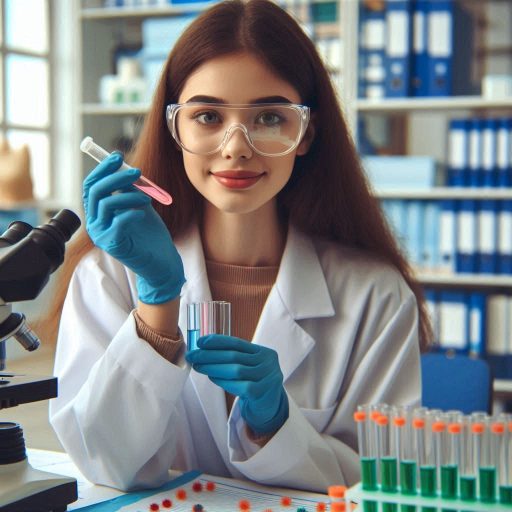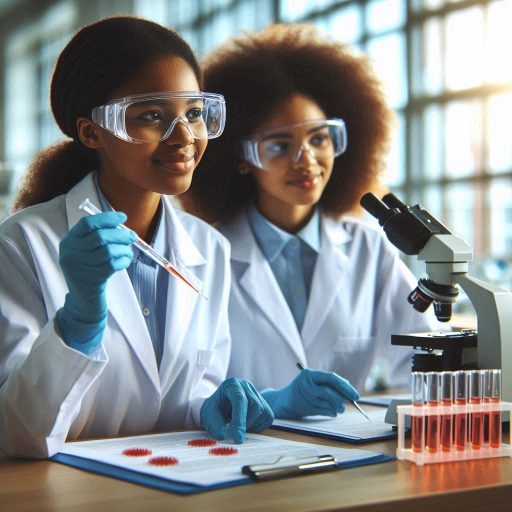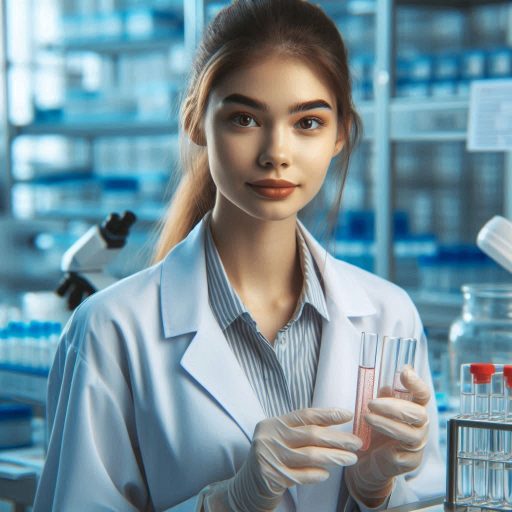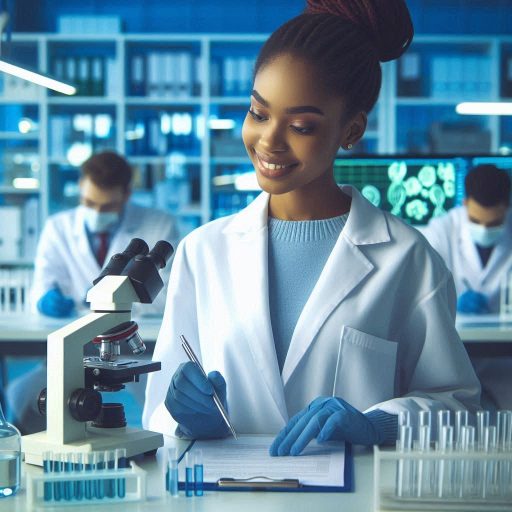Introduction
Microbiologists are scientists who study microorganisms, including bacteria, viruses, fungi, and algae.
They analyze how these organisms interact with their environments and impact human health.
Their research helps us understand diseases, develop new medicines, and create innovative solutions in various fields.
Biotechnology has emerged as a crucial field, integrating biology with technology to enhance products and processes.
In recent years, biotech startups have gained significant attention across multiple industries.
These startups are at the forefront of developing groundbreaking solutions in healthcare, agriculture, and environmental management.
They harness biological systems to create sustainable practices and improve overall quality of life.
The role of microbiologists in these startups is vital.
They provide expertise in microbial genetics, biochemistry, and molecular biology.
Their knowledge helps startups develop new drugs, vaccines, and diagnostic tools.
Microbiologists also play a key role in agricultural biotechnology, improving crop yields and resistance to pests.
By studying plant-microbe interactions, they can enhance soil health and sustainability.
In environmental biotech, microbiologists contribute to bioremediation efforts.
They develop methods to clean up contaminated sites using microorganisms.
Their work helps restore ecosystems and promote environmental sustainability.
Additionally, microbiologists explore the potential of microbes in producing biofuels and other renewable resources.
What is a microbiologist?
The Role of a Microbiologist
Microbiologists study microorganisms, including bacteria, viruses, fungi, and algae.
They explore the characteristics and behaviors of these tiny organisms.
Their work spans various fields, including healthcare, agriculture, and environmental science.
Microbiologists conduct experiments to understand how microorganisms interact with each other and their environments.
They develop new technologies and products that improve health, food safety, and environmental quality.
Educational Background and Skills Needed
To become a microbiologist, individuals typically pursue relevant education.
Most microbiologists hold at least a bachelor’s degree in microbiology or a related field.
Advanced roles often require a master’s or doctoral degree.
Coursework generally includes microbiology, biochemistry, and molecular biology.
Students gain hands-on experience through laboratory work and internships, which enhance practical skills.
Essential skills are crucial for aspiring microbiologists.
Strong analytical abilities enable them to interpret complex data and draw meaningful conclusions.
They must be detail-oriented to ensure accuracy in experiments and observations.
Problem-solving skills allow microbiologists to develop innovative solutions for biological challenges.
Effective communication skills are vital for presenting findings to colleagues and stakeholders.
They often write reports, publish research, and collaborate with multidisciplinary teams.
Importance of Microbiologists in Various Industries
Microbiologists play a vital role in various industries.
In healthcare, they study pathogens to develop vaccines and treatments for diseases.
Their research improves diagnostic tools, leading to better patient outcomes.
Microbiologists contribute to understanding infectious diseases, antimicrobial resistance, and public health issues.
In agriculture, microbiologists help enhance crop production and sustainability.
They research beneficial microorganisms that promote plant growth and combat diseases.
By studying soil microbes, they develop biofertilizers and biopesticides.
These innovations reduce reliance on chemical fertilizers, promoting environmentally friendly farming practices.
The food industry also relies on microbiologists for safety and quality.
They monitor food production processes to prevent contamination and spoilage.
Their expertise contributes to developing new food products, including functional foods with health benefits.
Microbiologists study fermentation processes that create yogurt, cheese, and other products.
Environmental microbiologists focus on bioremediation and ecosystem health.
They study microbial communities in soil and water, providing insights into environmental conditions.
Their work helps develop strategies for cleaning up contaminated sites.
By understanding microbial processes, they contribute to restoring ecosystems and promoting sustainability.
In biotech startups, microbiologists drive innovation.
They leverage their expertise to develop cutting-edge solutions in health, agriculture, and environmental science.
Microbiologists collaborate with engineers and other scientists to create new technologies.
Their contributions lead to breakthroughs that address global challenges, such as food security and disease prevention.
Essentially, microbiologists play an essential role in advancing science and technology across multiple industries.
Their educational background, skills, and research drive innovation, making them vital contributors to biotech startups and beyond.
Read: Profiles in Success: Leading Chemists of the 21st Century in the US
The rise of biotech startups
The Concept of Biotech Startups
Biotech startups have emerged as powerful players in the life sciences sector.
These companies focus on developing innovative products and technologies using biological systems and organisms.
By integrating biology with technology, they aim to address health, agricultural, and environmental challenges.
The Impact of Biotech Startups on Innovation and Research
The growth of biotech startups has transformed the landscape of innovation and research.
These companies often operate on the cutting edge of science, driving advancements in various fields.
Their agile structures allow them to adapt quickly to new discoveries and market demands.
By harnessing the potential of genetic engineering, synthetic biology, and microbiology, these startups create solutions that were once unimaginable.
Moreover, biotech startups significantly contribute to scientific research.
They foster collaboration among scientists, researchers, and investors, driving knowledge exchange.
This collaboration accelerates the development of new treatments, diagnostics, and therapies.
It also allows researchers to explore uncharted territories in biology and medicine.
The dynamic nature of these startups often leads to breakthroughs that large pharmaceutical companies might overlook.
Some Successful Biotech Startup Companies
Successful biotech startups exemplify this innovative spirit.
For instance, Modern gained global recognition for its mRNA technology, which revolutionized vaccine development.
The company’s rapid response to the COVID-19 pandemic showcased the power of biotech innovation.
Similarly, CRISPR Therapeutics is pioneering gene editing technologies to treat genetic disorders.
Their groundbreaking work demonstrates how startups can challenge traditional approaches to medicine.
Another notable example is Ginkgo Bioworks, a synthetic biology startup.
Ginkgo designs custom microbes for various applications, ranging from agriculture to pharmaceuticals.
Their innovative platform allows companies to streamline the development of biological products.
By simplifying the process, Ginkgo accelerates innovation across multiple sectors.
Bluebird Bio is another successful biotech startup focusing on gene therapies.
The company aims to treat severe genetic diseases by altering patients’ genetic material.
Their pioneering work offers hope to patients with conditions previously deemed untreatable.
The rise of biotech startups has reshaped the healthcare and agricultural landscapes.
Their focus on innovation drives the development of sustainable solutions that benefit society.
By pushing the boundaries of science, these startups contribute to a healthier world.
Most importantly, biotech startups play a vital role in fostering innovation and research.
Their contributions have far-reaching effects on healthcare and environmental sustainability.
As they continue to grow, these startups will remain at the forefront of scientific advancements, shaping the future of biotechnology.
Read: The Life and Times of a U.S. Physicist: A Day in Detail
The Role of Microbiologists in Biotech Startups
Microbiologists play a crucial role in the success of biotech startups.
Their expertise helps drive innovation and research in these rapidly evolving companies.
By studying microorganisms, they contribute valuable insights that propel product development and enhance scientific understanding.
How Microbiologists Contribute to the Success of Biotech Startups
One of the primary responsibilities of microbiologists in biotech startups is conducting research.
They design and execute experiments to understand microbial behavior and genetics.
This research often leads to the discovery of new applications for microorganisms.
These applications can range from developing pharmaceuticals to creating sustainable agricultural solutions.
Microbiologists also help optimize production processes.
They work on fermentation technologies, ensuring efficient growth and productivity of microbial cultures.
This optimization is essential for scaling up production and reducing costs.
By improving these processes, microbiologists enable startups to produce high-quality products in a cost-effective manner.
Quality control is another critical task for microbiologists.
They monitor microbial cultures for contamination and ensure compliance with safety regulations.
This monitoring guarantees that products meet industry standards and consumer safety requirements.
By maintaining high-quality standards, microbiologists protect the startup’s reputation and foster consumer trust.
The Specific Tasks and Responsibilities of Microbiologists in These Companies
Collaboration is vital in biotech startups, and microbiologists often work alongside other scientists.
They partner with molecular biologists, chemists, and bioengineers to develop innovative solutions.
This interdisciplinary approach leads to breakthroughs in product development and technology.
Microbiologists also play a significant role in regulatory compliance.
They navigate the complex landscape of biotech regulations and ensure that all products meet legal requirements.
This knowledge helps startups avoid potential pitfalls and accelerates the path to market.
Their expertise is essential for obtaining necessary approvals and certifications.
In addition to technical skills, microbiologists contribute to the business aspect of biotech startups.
They help translate scientific findings into viable products.
By understanding market needs, they can guide research efforts toward commercially successful outcomes.
Their input can shape business strategies and drive product commercialization.
The Importance of Microbiologists in Advancing Technology and Research in Biotech Startups
Furthermore, microbiologists are instrumental in advancing technology and research within biotech startups.
They stay updated on the latest scientific advancements and incorporate them into their work.
This continuous learning helps startups remain competitive in a rapidly changing industry.
Basically, microbiologists are vital to the success of biotech startups.
Their contributions span research, production optimization, quality control, and regulatory compliance.
By collaborating with other experts and translating science into marketable products, they drive innovation and help these companies thrive.
The impact of microbiologists extends beyond the lab, shaping the future of biotechnology and contributing to societal advancements.
Read: Salary Ranges: What to Expect as a Physicist in the USA
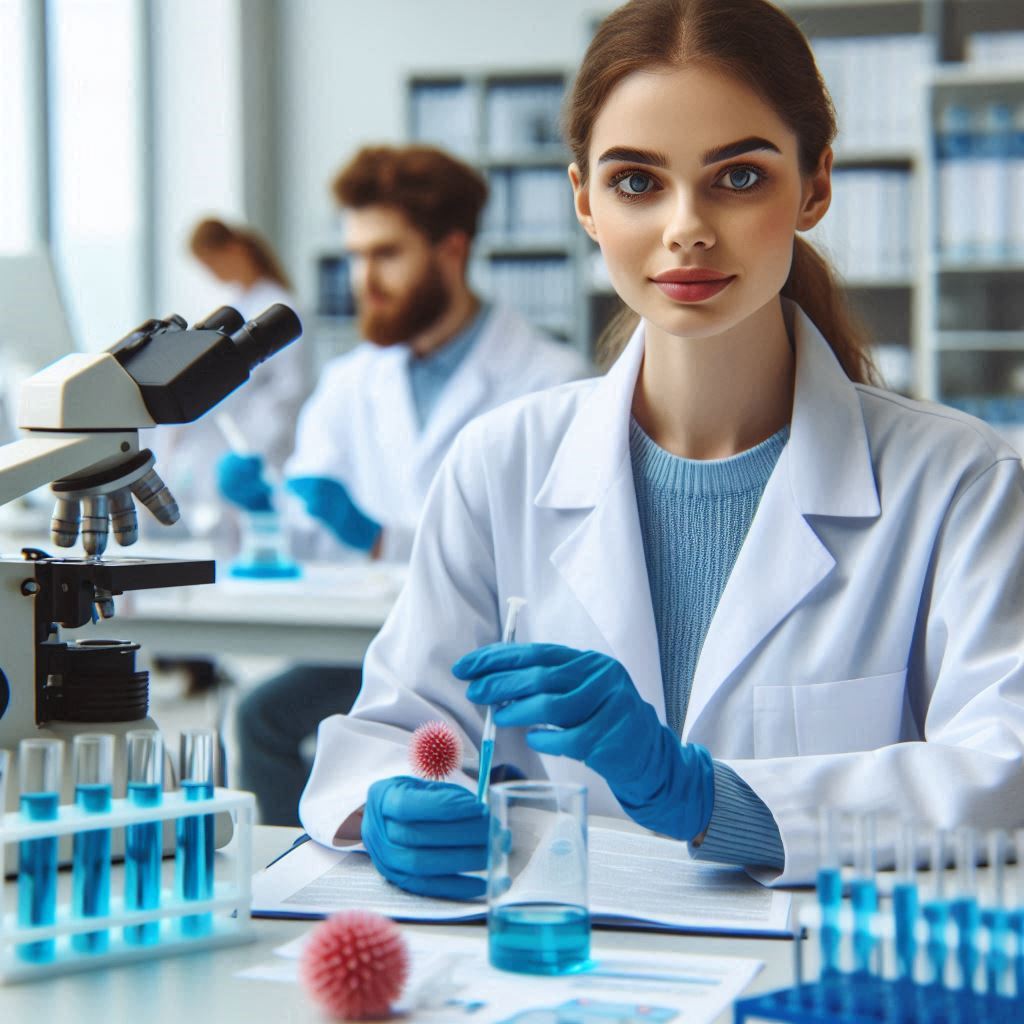
Collaboration with other professionals
Microbiologists play a crucial role in biotech startups.
They work alongside various professionals to drive innovation and success.
Collaboration is essential in this fast-paced field.
Microbiologists often team up with geneticists, biochemists, and engineers.
This interdisciplinary approach enhances problem-solving and creativity.
How Microbiologists Work Alongside Other Professionals in Biotech Startups
Each professional brings unique skills to the table.
Geneticists contribute insights into DNA manipulation and gene editing.
Biochemists help understand metabolic pathways and cellular functions.
Engineers design and optimize bioprocesses for product development.
By combining these diverse perspectives, startups can accelerate research and development.
The Benefits of Interdisciplinary Collaboration in Biotech Startups
Effective collaboration fosters a culture of knowledge sharing.
Microbiologists can learn new techniques and methodologies from their peers.
This exchange of ideas leads to innovative solutions.
It also helps identify potential challenges early in the process.
By addressing these challenges together, teams can streamline workflows and improve outcomes.
The Role of Teamwork in Achieving Success in This Field
Teamwork is vital in achieving the goals of biotech startups.
Microbiologists often lead experiments and provide essential data.
However, success depends on everyone’s contributions.
Team members must communicate openly and regularly.
Regular meetings and brainstorming sessions encourage collaboration and keep projects on track.
Interdisciplinary collaboration can also improve product development timelines.
By working closely with marketing and business professionals, microbiologists can align scientific goals with market needs.
This alignment ensures that products meet consumer demands and regulatory standards.
It also enhances the likelihood of attracting funding and investment.
Moreover, collaboration opens doors to new opportunities.
Microbiologists can connect with professionals in other sectors, such as agriculture or pharmaceuticals.
These connections can lead to partnerships and joint ventures, expanding a startup’s reach and impact.
It also fosters a network of support that can be invaluable in navigating challenges.
Additionally, diverse teams bring fresh perspectives to problem-solving.
Microbiologists might view a challenge differently than an engineer or a marketing expert.
This diversity can lead to innovative approaches and breakthroughs.
Successful startups often emphasize the importance of team dynamics and inclusive decision-making processes.
In fact, collaboration among microbiologists and other professionals is vital in biotech startups.
Interdisciplinary teamwork enhances creativity, problem-solving, and product development.
By fostering a collaborative environment, startups can drive innovation and achieve their goals more efficiently.
The combined expertise of various professionals ultimately leads to groundbreaking discoveries and successful products in the biotech industry.
Read: Physics Specializations: Choosing Your Path in the U.S.
See Related Content: The Role of Pharmacologists in Combatting Drug Abuse
Transform Your Career Today
Unlock a personalized career strategy that drives real results. Get tailored advice and a roadmap designed just for you.
Start NowChallenges Faced by Microbiologists in Biotech Startups
Microbiologists in biotech startups encounter unique challenges.
These challenges can hinder innovation and productivity.
Understanding these hurdles is essential for aspiring professionals.
Common Challenges That Microbiologists Face in the Industry
Limited Resources
Startups often operate with tight budgets.
Microbiologists may lack access to advanced equipment and facilities.
This limitation can restrict research and development efforts.
Rapidly Changing Regulations
Biotech startups must navigate complex regulatory environments.
Microbiologists face challenges related to compliance with safety and quality standards.
Staying updated with regulations is crucial for success.
High Failure Rates
The failure rate of biotech startups is notably high.
Microbiologists may face setbacks during experimentation or product development.
These failures can be disheartening and affect morale.
Interdisciplinary Collaboration
Biotech projects often require interdisciplinary teamwork.
Microbiologists may need to collaborate with engineers, chemists, and business professionals.
Miscommunication or lack of understanding between disciplines can lead to complications.
Time Constraints
Startups often operate under tight timelines.
Microbiologists may feel pressure to deliver results quickly.
This urgency can compromise the quality of research.
How These Challenges Can Be Overcome
To overcome limited resources, microbiologists should prioritize essential tools and technologies.
They should seek partnerships with established institutions for access to resources.
Collaboration can enhance their capabilities and broaden their knowledge base.
To address rapidly changing regulations, microbiologists should engage with regulatory experts early in the process.
Attending workshops and training sessions can help them understand evolving guidelines.
To cope with high failure rates, microbiologists must cultivate resilience.
They should learn from failures and adapt their strategies.
Emphasizing iterative processes can improve outcomes and drive innovation.
To foster effective interdisciplinary collaboration, microbiologists should improve their communication skills.
They should also actively participate in cross-functional teams.
This involvement can enhance mutual understanding and drive project success.
To manage time constraints effectively, microbiologists should adopt project management tools.
These tools can help them prioritize tasks and streamline workflows.
Setting realistic deadlines can also alleviate stress and improve productivity.
Tips for Aspiring Microbiologists Looking to Work in Biotech Startups
For those aspiring to work in biotech startups, understanding these challenges is vital.
Building a solid foundation in microbiology is essential.
Gaining practical experience through internships can enhance skills and confidence.
Networking with industry professionals can provide valuable insights and opportunities.
Joining professional organizations can help aspiring microbiologists stay updated on industry trends.
In short, microbiologists in biotech startups face numerous challenges.
By proactively addressing these hurdles, they can contribute significantly to their teams.
With determination and adaptability, they can thrive in the dynamic biotech landscape.
Opportunities for Growth and Advancement for Microbiologists in Biotech Startups
The Career Opportunities Available for Microbiologists in Biotech Startups
Microbiologists play a crucial role in biotech startups.
They help develop new products, improve processes, and innovate solutions.
This field offers numerous career opportunities for microbiologists.
Startups often seek skilled professionals to drive their research and development efforts.
As these companies grow, microbiologists can take on increasing responsibilities.
They can advance to senior research positions or managerial roles.
Potential Areas for Growth and Advancement in This Field
Microbiologists can specialize in various areas within biotech.
They may focus on pharmaceuticals, agriculture, or environmental biotechnology.
Each specialization presents unique growth opportunities.
For example, those working in pharmaceuticals may develop new drugs or therapies.
In agriculture, microbiologists might enhance crop yields or develop sustainable pest control methods.
Environmental microbiologists can work on bioremediation projects, restoring polluted sites.
Many biotech startups emphasize interdisciplinary collaboration.
Microbiologists often work alongside chemists, engineers, and data scientists.
This collaboration opens up new avenues for learning and growth.
Working in diverse teams allows microbiologists to expand their skill sets.
They gain insights from other disciplines, which can enhance their research capabilities.
The Importance of Continuous Learning and Development for Microbiologists in Biotech Startups
Continuous learning is vital for microbiologists in biotech startups.
The field evolves rapidly, with new techniques and technologies emerging frequently.
Microbiologists must stay updated on the latest advancements.
Participating in workshops, conferences, and training programs is essential.
These opportunities enable them to acquire new skills and knowledge.
Online courses also provide valuable learning experiences.
Many platforms offer specialized courses in microbiology, biotechnology, and related fields.
Microbiologists can tailor their learning to align with their career goals.
Networking with industry professionals can also foster growth.
Joining professional organizations can provide access to resources and job opportunities.
Moreover, mentorship plays a crucial role in professional development.
Experienced microbiologists can guide newcomers in navigating their careers.
Mentors can provide insights into industry trends and best practices.
They can also help identify potential career paths within the startup ecosystem.
Biotech startups often promote a culture of innovation and experimentation.
Microbiologists can pitch their ideas for new projects or research directions.
This environment encourages creativity and initiative, leading to personal and professional growth.
All in all, microbiologists have numerous opportunities for growth in biotech startups.
They can advance their careers by specializing in various fields and collaborating with diverse teams.
Continuous learning, networking, and mentorship are essential for success.
By embracing these opportunities, microbiologists can significantly impact the biotechnology industry and drive innovation.
Explore Further: Online Courses and Resources for Botany Students
Conclusion
Microbiologists play a vital role in biotech startups.
They apply their expertise to various projects, driving innovation and research.
Their skills in studying microorganisms help develop new products and solutions.
These professionals contribute significantly to healthcare, agriculture, and environmental sectors.
In healthcare, microbiologists focus on developing vaccines and therapies.
They analyze pathogens to create effective treatments.
Their work helps combat infectious diseases and improve public health.
By understanding microbial interactions, they can enhance drug effectiveness and reduce side effects.
This innovation leads to better patient outcomes and advances in medical science.
Microbiologists also contribute to agricultural biotechnology.
They develop biofertilizers and biopesticides, promoting sustainable farming practices.
By harnessing beneficial microorganisms, they improve crop yields and protect plants from pests.
Their research supports food security and environmental sustainability, making agriculture more resilient.
In the environmental sector, microbiologists address pollution and waste management.
They design bioremediation strategies to clean contaminated sites.
Their knowledge helps break down pollutants and restore ecosystems.
Through innovative solutions, they contribute to a healthier planet and enhance quality of life.
The contributions of microbiologists to biotech startups are crucial.
They foster collaboration among scientists, entrepreneurs, and industry experts.
This teamwork leads to innovative solutions and the rapid development of new technologies.
Their ability to adapt and innovate drives the success of biotech ventures.
[E-Books for Sale]
The Big Book of 500 High-Paying Jobs in America: Unlock Your Earning Potential
$19.99 • 500 High-Paying Jobs • 330 pages
Explore 500 high-paying jobs in America and learn how to boost your career, earn more, and achieve success!
See All 500 High-Paying Jobs of this E-Book
1001 Professions Without a Degree: High-Paying American Jobs You Can Start Now
$19.99 • 1001 Professions Without a Degree • 174 pages
Discover 1001 high-paying jobs without a degree! Unlock career tips, skills, and success strategies for just $19.99!

